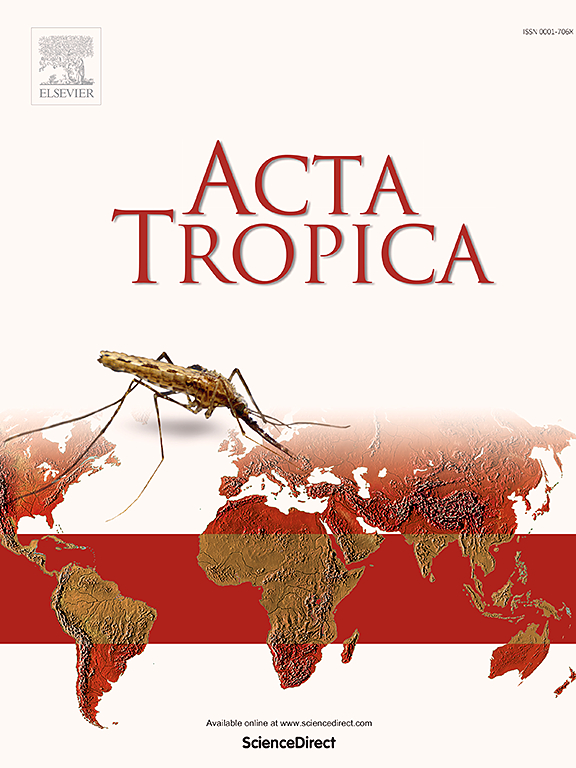牛寄生虫逆向疫苗学效率的证据:系统综述。
IF 2.1
3区 医学
Q2 PARASITOLOGY
引用次数: 0
摘要
反向疫苗学是一种新型疫苗开发技术,它通过生物信息学对基因组和蛋白质组进行分析,以快速、廉价的方法选择能够引起免疫和保护性反应的抗原表位。然而,有关其在动物保健中应用的数据却很少,因此需要进一步研究。因此,本系统综述旨在评估反向疫苗学在寻找牛寄生虫抗原方面的效率证据,以及其前景和局限性。共找到 174 项研究,按照 PRISMA 指南并考虑到所有数据库,选择了其中 95 项进行全面阅读。经过最后评估和阅读参考文献后,仅有 19 项研究被纳入其中,并对其方法质量和偏差进行了评估。这些研究将反向疫苗学应用于影响牛的细菌、原生动物和体外寄生虫,重点是蜱类 Rhipicephalus microplus 和以其为媒介的巴贝西亚原生动物。大多数研究通过 ELISA、WB 和 IFAT 分析来评估免疫反应的获得情况,主要测量 IgG。此外,许多研究并没有检查寄生虫的完整蛋白质组,只是在硅学、体外或甚至是与寄生虫无关的动物中进行,这也是这些研究被排除在我们的系统综述之外的原因。由于缺乏符合资格标准的研究,在本系统综述中,我们还纳入了针对不同寄生虫组和种类进行的研究,从而为这一技术在养牛业中的应用提供了一个广泛的概览。相反,这也导致了研究方法的多样性,从而使研究之间的比较变得困难。尽管如此,反向疫苗学在养牛业中的应用已在牛的免疫和保护性反应发展方面取得了可喜的成果。然而,除了明确数据和方法以实现可重复性外,还需要改进研究方法,以减少偏差并获得可靠的结果。本文章由计算机程序翻译,如有差异,请以英文原文为准。
Evidence of the efficiency of reverse vaccinology against bovine parasites: A systematic review
Reverse vaccinology is a novel vaccine development technology that uses genome and proteome analyses through bioinformatics to select antigenic epitopes capable of eliciting an immunological and protective response through a quick and cheap methodology. However, data on its use in animal health are scant and further research is advocated. Therefore, this systematic review aimed to evaluate the evidence of the efficiency of reverse vaccinology in the search for antigens against bovine parasites, as well as its perspectives and limitations. One hundred seventy-four studies were found, of which 95 were selected for full reading following the PRISMA guidelines and considering all databases. After the last evaluation and reading of the references, only 19 studies were included and evaluated for methodological quality and biases. The studies applied reverse vaccinology to bacteria, protozoa, and ectoparasites that affect cattle, emphasizing on the tick species Rhipicephalus microplus and the protozoa of the genus Babesia that use it as a vector. Most studies evaluated the acquisition of an immune response through ELISA, WB and IFAT analyses to measure predominantly IgG. In addition, many studies did not examine the complete proteome of the parasites and are carried out only in silico, in vitro, or even with unrelated animals, the reason why they were excluded from our systematic review. Due to lack of studies that met the eligibility criteria, in this systematic review we also included studies carried out with different groups and species of parasites, providing a broad overview of the application of this technique in cattle farming. Conversely, this also resulted in variable methodologies, which makes comparison among studies difficult. Despite that, the application of reverse vaccinology in cattle farming has shown promising results in the development of immunological and protective responses in cattle. However, research methodologies need to be improved to reduce biases and obtain reliable results, in addition to clarity of data and methodologies to enable reproducibility.
求助全文
通过发布文献求助,成功后即可免费获取论文全文。
去求助
来源期刊

Acta tropica
医学-寄生虫学
CiteScore
5.40
自引率
11.10%
发文量
383
审稿时长
37 days
期刊介绍:
Acta Tropica, is an international journal on infectious diseases that covers public health sciences and biomedical research with particular emphasis on topics relevant to human and animal health in the tropics and the subtropics.
 求助内容:
求助内容: 应助结果提醒方式:
应助结果提醒方式:


